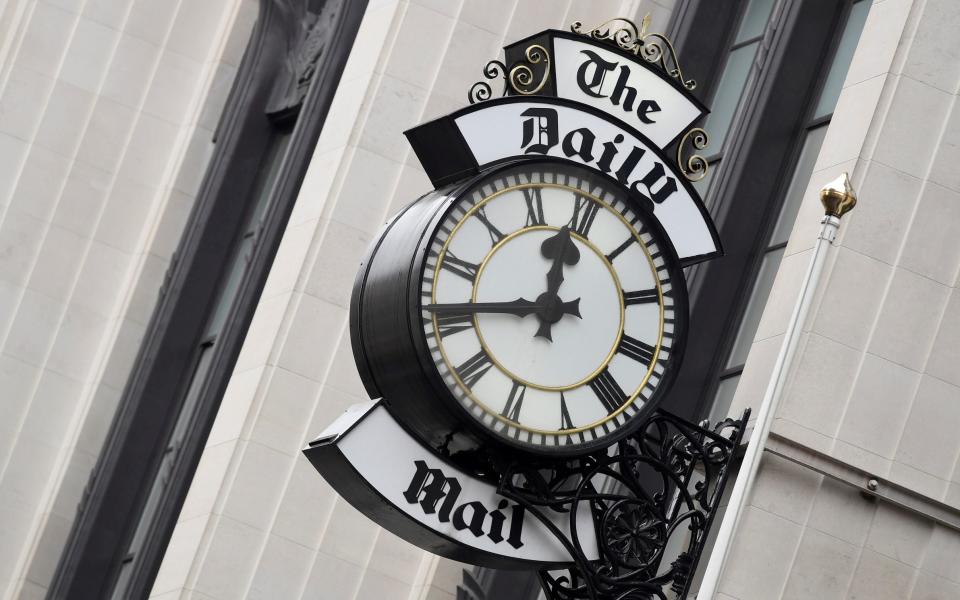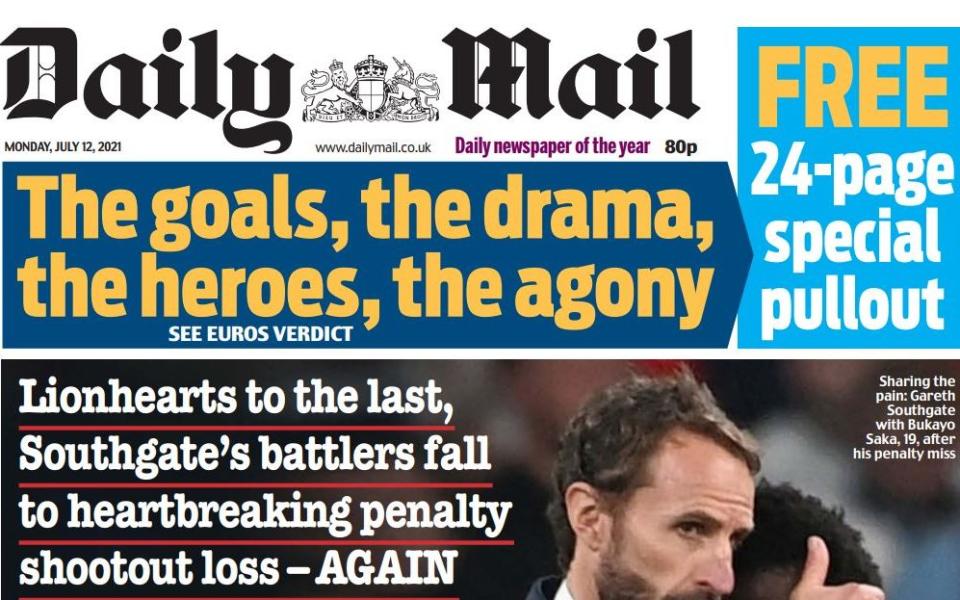Investors demand more detail on Lord Rothermere's plan to delist Daily Mail

Plans by Lord Rothermere to take the publisher of the Daily Mail private have been greeted with caution in the City, amid concern that the complicated deal may undervalue the company.
One top five shareholder told The Telegraph that “we need much more information” about the proposals from the chairman of Daily Mail and General Trust (DMGT), which would delist the company after nearly 90 years on the stock market.
Lord Rothermere, 53, is the head of the family that founded the Daily Mail in 1896.
Much of the caution is driven by the multiple uncertainties over the planned three-part deal. It first involves the sale of RMS, an insurance software subsidiary, to an unnamed bidder for an undisclosed price, with the proceeds distributed to DMGT shareholders.
Then the company’s 16pc stake in Cazoo, a used car website that plans to list in New York this year on a generous £5bn valuation, will also be handed over to investors.
Finally, Lord Rothermere plans to buy out the remaining publishing business, which as well as the Daily Mail includes Metro and MailOnline, for £810m including debt.
DMGT shares climbed more than 3pc to £10.74 but remain significantly short of the value of nearly £13 per share that analysts claimed the proposed deal implied.
Another top 10 shareholder said the plans “look like a reasonable sighting shot” and conceded that the company’s unusual governance, which gives Lord Rothermere all the voting rights although he only owns a 36pc stake, means there will be no competing bid.
But Thomas Singlehurst, from investment bank Citi, said there were questions whether the valuation for the publishing business is “sufficiently generous”.
The company said that its independent directors believe the offer represents attractive value for shareholders. Any deal could be completed as soon as September, subject to a further reorganisation of its pension scheme.
The move would end almost 90 years of public ownership of DMGT.
Jonathan Harmsworth, the great-grandson of its founder and 4th Viscount Rothermere, has remained chairman of DMGT and its largest shareholder during a turbulent period that turned MailOnline into the world’s most popular English language news site.
However, DMGT has been battered by declining print advertising sales, falling print readership and the dominance of Facebook and Google in the digital ads market.
In January, it reported a fall in first quarter revenues of 15pc as print advertising dropped by 38pc.
The company has diversified into other online enterprises, at one stage owning 40pc of property website Zoopla as well as scooping up a stake in Cazoo. It sold the remaining half of its stake in the financial publisher Euromoney in 2019.
Analysts at Barclays said the total payout to shareholders would add up to £12.80 a share - 23pc higher than Friday's £10.40 closing price.
A take-private deal would be the latest reshuffle of British newspapers after the Daily Mirror owner Reach bought the Express and Star titles from Richard Desmond's Northern & Shell in 2018.
Keeping it in the family
Jonathan Harmsworth is committed to the family business. Little more than a month after his father’s passing in September 1998, Guy Zitter, then managing director of his newspaper stable, was unequivocal. “The Fourth Viscount Rothermere intends to hand the Mail on to his son Vere, who is not yet four years old.” he said.
Lord Rothermere, now 53, signalled his plans are unchanged. He “would be prepared to make a possible cash offer” to acquire the roughly 70pc of Daily Mail & General Trust (DMGT) that he does not own and take the business private after nearly 90 years on the stock market.
His great-grandfather Harold Harmsworth, alongside brother Alfred, published the first edition of the Daily Mail in 1896. After the First World War, he began diversifying DMGT and sought the prestige of a stock market listing, although not the access to capital it normally provides.
“The company has never issued new shares. So they don’t really use stock markets. They don’t really use equity," says Alex DeGroote, a media analyst.
Rothermere’s long-expected bid to take DMGT private comes alongside talks to sell RMS, an insurance industry software venture from the less glamorous end of his empire.
Barclays estimates that RMS will fetch 610p for each DMGT share. At the same time, Rothermere plans to distribute the company’s 16pc stake in Cazoo, a nascent by highly valued used car website, to shareholders. Alex Chesterman, its founder, is preparing to list Cazoo in New York on a valuation of £5bn, equivalent to another 420p for each DMGT share.
Rothermere’s family firm would then pay 251p per share cash for the remainder of DMGT, including the Daily Mail, the MailOnline website, the i and New Scientist.
Analysts are forecasting that shareholders are in line to receive the equivalent of almost £13 a share in cash and Cazoo shares. However DMGT shares closed more than £2 a share short of that figure, reflecting uncertainty that the complex transaction will be completed, as well as questions over the valuation of Cazoo.
Rothermere will also have to convince the trustees of DMGT's three pension schemes to approve the deal. As the company that emerges will be smaller, they are likely to seek extra comfort that pensioners will be looked after. Although in surplus on an accounting basis, the retirement funds are in deficit, according to a more conservative actuarial calculation.
Thomas Singlehurst, from investment bank Citi, says: “Clearly there are a lot of 'conditionals' ahead of this getting done - there is also the question as to whether a bid for the rump at [a valuation of less a year’s worth of] sales is sufficiently generous.”
As shareholders digested the news yesterday, there was caution in the City. “We need much more information,” said one of DMGT’s five biggest investors.
A second big backer, a top 10 shareholder, is more pragmatic. “It looks like a reasonable sighting shot,” says the fund manager. There is little prospect of a bidding war, he concedes. “This isn't a process where you're going to get any great competitive tension and you're going to get a load of other bidders coming in.”
Rothermere’s fellow shareholders have limited sway anyway. DMGT’s unusual governance grants all the voting rights to its chairman. Complete control for Rothermere cost DMGT its premium listing and place in major indices, and imposed a discount on the shares. Those fund managers who have remained invested have accepted his terms.
“You kind of along for the ride with this one,” says the top 10 shareholder. “You are relying on trusting the Rothermere family and non-executives to act in your best interests and look after minority shareholders.”
Rothermere’s decision to seek to take DMGT private has sparked speculation in the City that he may be planning an eventual handover to the next generation. By taking the company private, he will avoid shareholder scrutiny if this is done in a more tax efficient way.
There are big questions of strategy that Rothermere may prefer to tackle away from the glare of the public market, too. Alongside chief executive Paul Zwillenberg, he has been rapidly slimming down and simplifying the business to focus on consumer publishing, even as the print newspapers on which the family fortune was built accelerate their decline.

Education business Hobsons, Genscape, an energy data firm, and property website Zoopla have been offloaded for a total of £1.2bn in recent years.
“The liquidation of DMGT has been underway probably for two to three years now,” says DeGroote. “Today is the final stage of that liquidation.”
The Mail stable is ripe for a restructure, onlookers say. James Welsh, deputy finance chief, has been hired to oversee the wider restructuring of the business as part of the sale.
“DMG media has and will continue to be the cornerstone of the group,” staff were told in an internal memo on Monday.
As the Times and Sunday Times merge to cut costs, Rothermere and his advisers are likely to have one eye on mirroring the exercise with Daily Mail and Mail on Sunday to cut costs. Meanwhile, media watchers are confused about the interplay between free-to-read MailOnline and the newer subscription service Mail+. The Telegraph's website and mobile app, and its daily and Sunday print editions, are produced by a single integrated team.
Rothermere will also be able to capitalise on his optimising the ownership of the Mail’s printing presses. Analysts now expect market consolidation with only a small number of larger players remaining.
Owning print presses is an expensive business that requires them to be used as much as possible. As print sales decline, buying more titles will make sense for a committed publisher such as Rothermere. Meanwhile the media regulator Ofcom is reviewing plurality rules that have been viewed as a barrier to consolidation.
A private DMGT would emerge with cash on hand to do more deals to build on its purchases of the i and New Scientist. Media sources suggest it is in the running to acquire the magazine publisher Dennis. It is on the block in an auction run by the specialist investment bank LionTree, and Rothermere made the second-highest bid when it was last sold three years ago.
DeGroote sums the situation up: “The feeling in the market has always been that Rothermere, more than any other asset, is sort of wedded to the Mail titles. They would be sold over his dead body.”

 Yahoo Finance
Yahoo Finance 